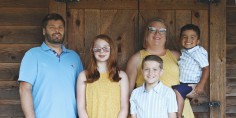
Tamika D. Williams
Associate Director
Child & Family Well-Being Program Area
As we reflect on National Foster Care Month, we celebrate those who have assumed the role of caregiver for children who need homes. We also encourage more families to open their hearts and homes to children who await placements and connections, even as we pause to acknowledge the many emotions, including heartache, that those involved may experience.
When a child is removed from a primary caretaker and placed with kin or a foster family, this separation is often traumatic for the child – rife with pain and uncertainty about every aspect of life. A quote by Jody Landers of The Adventure Project sums it up well: “A child born to another woman calls me mom. The depth of the tragedy and the magnitude of the privilege are not lost on me.” Countless kinship caregivers and foster parents share this sentiment as they help children in foster care.
For almost three decades, the Child & Well-Being program area of The Duke Endowment has intentionally focused its advocacy and grantmaking by engaging the public sector to identify opportunities to enhance foster care and encouraging private agencies to broaden their services, including the recruitment, retention and support of foster and kinship caregivers. Research tells us that individuals arrive at the decision to foster based on many reasons. Whatever the reason, we know that caring for children requires additional knowledge and skill. Families need training, coaching, guidance, and supervision to assist children who are dealing with complex emotions ranging from grief and loss, to anger and sadness, to hope and excitement. Foster families also need the resources to care for themselves so that they can fulfill the purpose that led them to heed the call. The Endowment’s grantmaking has supported curricula and models like Together Facing the Challenge, ARC Reflections, and Trust-Based Relational Intervention, which are trauma-informed approaches that show positive impact on preparing caregivers to care for the children in their home.
Like other child welfare systems, North Carolina and South Carolina continually recruit families for children in care. In North Carolina, the Endowment has supported multi-year efforts that aim to increase the availability of trained and well-supported caregivers. For example, Crossnore has partnered with United Methodist churches in the Triad and Western North Carolina and Baptist Children’s Homes has partnered with the Baptist State Convention to recruit foster parents. Similarly, Epworth Children’s Home in South Carolina has worked with United Methodist churches to identify families for youth in care. Thompson has spread its footprint to identify families in both states with specific expansion efforts in eastern North Carolina for harder to place youth. Combined, these organizations have licensed more than 900 foster families over the last five years and report at least a 75 percent two-year retention rate. More than 1,200 children have been placed with the goal that children will have greater placement stability and only move when permanent homes are identified. Currently, Baptist reports 96 percent of moves are for permanency. Each organization has also strengthened their programs by adopting foster parent training models, providing wrap around services and adding peer support groups.
Kinship caregivers’ needs are similar to those of traditional foster parents, but they also have unique family circumstances that must be taken into consideration when fostering. HALOS in Charleston, S.C., is an agency that focuses solely on this population. HALOS provides case management and wrap-around supports tailored to the expressed needs of families. As these caregivers are typically older, single and living on fixed incomes, HALOS’ interventions include advocating with school systems, identifying mental health services and pursuing additional economic resources to aid families. In North Carolina, a multi-year grant to the Family Focused Treatment Association has formed a partnership among three public agencies and three private agencies to build a continuum of support for therapeutic kinship providers. Early findings suggest identifying agency champions, working in small teams, including kin caregivers in planning and collaborating with external technical assistance providers are key strategies to support implementation.
Mr. Duke’s Indenture of Trust charged us a century ago to help those most unable to help themselves. One of the ways we live into this directive is to make certain our efforts and grantmaking ensure that those who care for children are seen, supported and strengthened. It is hard work; and, yet it makes all the difference to a child and our world. As we look back and appreciate National Foster Care Month, we are thankful for the many partners who share and advance our mission in service to children and families, and we are grateful that they also hold us accountable to never lose sight of what we are called to do.





